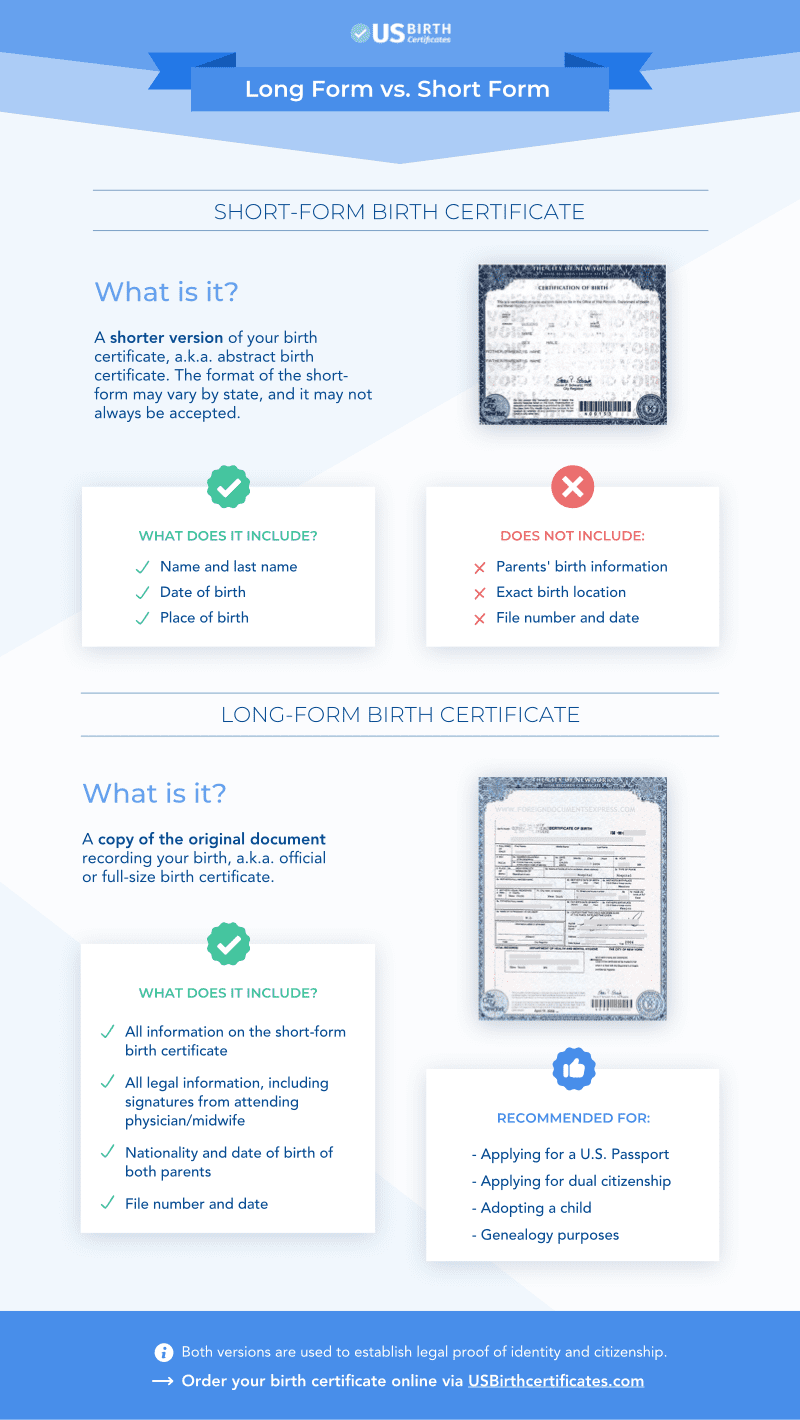

A Birth Certificate is a vital document issued to U.S. citizens that allows them to apply for various benefits and ID documents. If your certificate is lost, misplaced, damaged or destroyed then you will need to apply for a birth certificate replacement.
To obtain a certified copy of your birth certificate, you are required to complete an online form from the state where the birth took place and pay the state processing fees. In some states, you are required to notarize your application, which means signing it in front of a public notary to prove your identity.
When completing the birth certificate application, in most cases, you will be required to choose between the long-form version or the short-form version. Depending on the reason for requesting a birth certificate, you will have to choose one or the other. Both versions can be used to establish identity and citizenship, and contain important information regarding the birth, like names, date, and place.
Also, each state offers a different version of these formats, that is why it is important to understand when presenting an out of state birth certificate, which is the required format.
 form vs short form birth certificate" />
form vs short form birth certificate" />
A short-form birth certificate is a comprised version of the long-form. It contains the most important information such as names, the date, and place where the birth occurred, but will not include any detailed information, like parents, birth dates, and the exact location where the birth occurred (i.e.; hospital, home, birthing facility.)
Each state has its version of short-form birth certificate format, also often referred to as abstracts, because they only provide a fraction of information of the long-form. In some states, they are very similar to the long version and are even considered to be the standard size.
A long-form birth certificate often referred to as the official birth certificate, and full-size birth certificate, is a copy of the original document. It contains all the legal information, including signatures from the attending physician or midwife. It also includes the nationality and birth dates of both parents.
The long version also includes a file number, and the date when the birth certificate was filed, the short form does not.
Both the long and short versions of the birth certificate are used to establish legal proof of identity and citizenship. Therefore, both version can be used by someone to obtain state-issued ID like a driver’s license, as well as a Social Security card and a passport.
However, the short version may not always be accepted by every state or for all applications, since in some instances the requested copy of the birth certificate must include the full name, gender, precise time, date, and location of birth, and the parents; full names (including the mother;s maiden name), dates of birth, and places of birth. For example, if you are beginning the process of adopting a child, you are required to provide a long-form birth certificate.
Genealogy experts also recommend the use of the long-form certificate because it paints a much more detailed picture of the parents.
It can take a longer to obtain a copy of a long-form birth certificate, but both the long form and short form are officially certified and valid. If you are not sure which version best applies to your situation you can contact your local government branch, like city hall, for further information.

Once a baby is born both a Certificate of Live Birth, is issued. The Certificate of Live Birth is an document which serves is primarily for data entry purposes, and cannot be used as a replacement for a birth certificate.
The Certificate of Live Birth documents that a birth took place and that a human being has entered the world. It includes:
Once the hospital record is created, the Certificate of Live Birth is sent to the vital records office, where it is used to create and issue a Birth Certificate.
The Certificate of Live Birth verifies that the registrant was born and is alive by medical standards, whereas the Birth Certificate verifies identity.